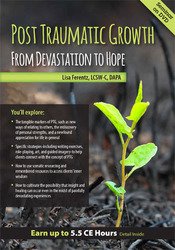

Although it’s important for therapists to help clients process the painful and often demoralizing effects of trauma, it’s also crucial to nurture their potential for new possibilities of healing through post-traumatic growth (PTG). In fact, learning respectful ways to plant seeds of hope and resilience can make all the difference when working with trauma survivors. In this workshop, you’ll explore:
This online program is worth 5.0 hours CPD.
| File type | File name | Number of pages | |
|---|---|---|---|
| Handouts (0.16 MB) | 8 Pages | Available after Purchase |

Lisa Ferentz, LCSW-C, DAPA, is a recognized expert in the strengths-based, de-pathologized treatment of trauma and has been in private practice for over 35 years. She presents workshops and keynote addresses nationally and internationally, and is a clinical consultant to practitioners and mental health agencies in the United States, Canada, the UK and Ireland.
She has been an adjunct faculty member at several Universities, and is the Founder of “The Ferentz Institute,” now in its 11th year of providing continuing education to mental health professionals and graduating over 1,200 clinicians from her two certificate programs in Advanced Trauma Treatment.
In 2009, she was voted the “Social Worker of Year” by the Maryland Society for Clinical Social Work. Lisa is the author of Treating Self-Destructive Behaviors in Trauma Survivors: A Clinician’s Guide, 2nd Edition (Routledge, 2014), Letting Go of Self-Destructive Behaviors: A Workbook of Hope and Healing (Routledge, 2014), and Finding Your Ruby Slippers: Transformative Life Lessons From the Therapist’s Couch (PESI, 2017). Lisa also hosted a weekly radio talk show, writes blogs and articles for websites on self-harm and self-care, and teaches on many webinars.
Speaker Disclosures:
Financial: Lisa Ferentz maintains a private practice and is the Founder and President of the Ferentz Institute. She receives royalties as a published author and is a consultant for Northwest Hospital. Lisa Ferentz receives a speaking honorarium and product royalties from Psychotherapy Networker and PESI, Inc. She has no relevant financial relationships with ineligible organizations.
Non-financial: Lisa Ferentz is a member of the National Association of Social Workers and the American Psychotherapy Association.
| 5 |
|
| 4 |
|
| 3 |
|
| 2 |
|
| 1 |
|
Satisfaction Guarantee
Your satisfaction is our goal and our guarantee. Concerns should be addressed to info@pesi.co.uk or call 01235847393.
Please wait ...